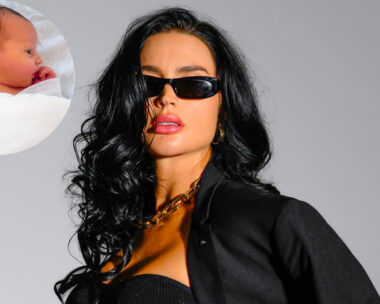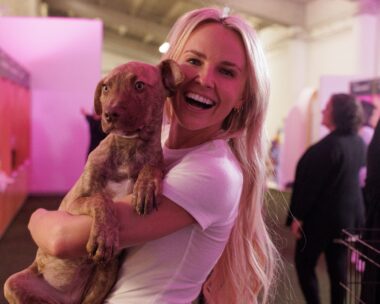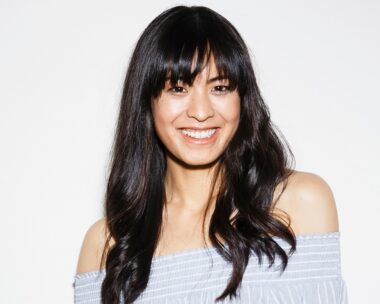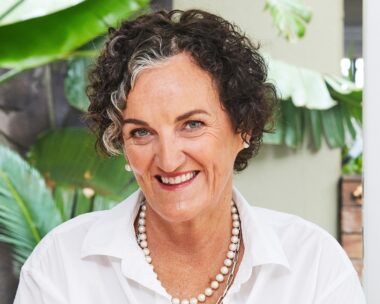Rikki Swannell is one of the country’s most respected sports broadcasters, with one of the most recognisable voices in the commentator box. And while she’s been working in the public eye for the past 15 years, she admits waiting for the release of her new book, Seven Sisters, takes the cake for nerve-wracking experiences.
“It’s undoubtedly the most challenging thing I’ve done,” tells Rikki. “There’s a special kind of anxiety that comes with putting some work like this out into the world. Give me live television any day!”
Seven Sisters tells the story of how the Black Ferns Rugby Sevens team transformed their game and team culture after their loss at the 2016 Olympic Games final, and became the most dominant force on the field over the next five years.
Rikki, 41, has travelled the world with the team, commentating on the World Sevens series, and as an Olympics reporter she was on the ground when they finally got their hands on the gold medal in Tokyo.

With Ruby Tui winning gold in Tokyo in 2020.
The idea for the book was born before the players had even left the field and once they returned to New Zealand, she spent the following months talking with the team and support staff. Because of the special bond Rikki built with the group, she says she felt a lot of pressure to get the story right.
“I found writing pretty agonising,” tells Rikki with a laugh. “I don’t know how people do it as a full-time job because you’re just racked with anxiety and loathing all the time.
“There are so many amazing people in the team and I wanted to do them justice. People ask me all the time, ‘Are they genuinely as nice as they seem?’ And they are. I can’t speak highly enough about the Black Ferns Sevens.”
When the Weekly speaks to Rikki, she is in Dingle Peninsula, the westernmost point of Ireland, as she completes the last leg of a five-month holiday around Europe. Her final hurrah is a 10-day road trip exploring the length of Emerald Isle before diving back in to work at the Commonwealth Games in Birmingham.
“I keep saying to people, ‘I’ve got to go to work because I’ve got to pay for this bloody trip,” Rikki laughs. “I was desperate to get back out in the world!”

Rikki’s roadtrip in Ireland.
This will be Rikki’s fourth time at the Commonwealth Games. She has also been to three Summer and two Winter Olympics, but she still feels the same excitement when she gets to report from the prestigious events.
“I always say that the day you turn up to an event and you’re bored, that’s the time to walk away,” tells Rikki. “The only thing I ever wanted to do was go to the Olympics as a reporter. I’d happily keep going until I’m 80 and an old grey woman.”
Sport has always played a major role in Rikki’s life. Her family are all passionate sports lovers and players. And though she played volleyball and netball all through her childhood and dabbled in rugby, Rikki confesses she had no illusions that a professional career was on the cards for her.
“I was the black sheep of the family in terms of athletic prowess,” she admits. “I played everything and I was fine, but I was never going to be anything great. I just loved being with my mates and playing sport.
“I always wanted to talk about it or write about it. There’s way less running involved!” she grins.
Instead, she pursued her dream of becoming a sports journalist and has since defied gender stereotypes to become one of Aotearoa’s top broadcasters.
When Rikki started, she was one of a small handful of women in the field. When she was named as the new play-by-play commentator for Sky Sport’s Super Rugby coverage in 2018, she was the first woman to ever hold the role.
“When I was first starting, I didn’t notice the lack of women. I was more focused on doing a good job,” she recalls. “It wasn’t until I got a little bit older and found my voice in the newsroom that I thought about it.”
She was delighted to be a part of Sky’s all-female team that travelled to the Tokyo Olympics in 2021, but she says while strides have been made, there is still more work to be done.

With Sky Sport’s first-ever-all-female Games reporting team (from left) Storm Purvis, Kirstie Stanway and Kristina Eddy.
“It’s been a long time coming and we’ve still got a long way to go,” insists Rikki. “Our sports newsrooms are still very male-dominated. But I think the room is finally being made and people are realising we need to look at sport from a different lens, and that includes having more Māori and Pasifika journalists as well.”




